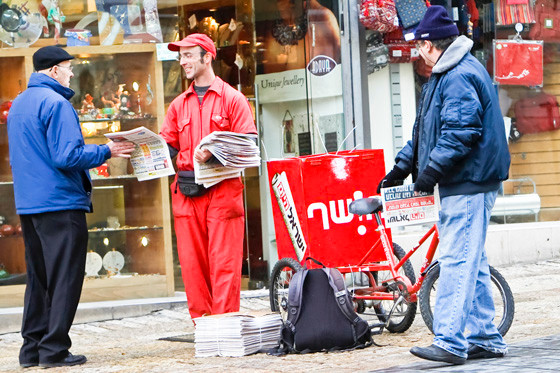Ban threatens Israeli democracy and capitalism
Bill would kill newspaper; ‘Who are you, democrats or Bolsheviks?
After recently advancing in the legislative process, a controversial bill to ban free print newspapers in Israel has reignited a debate in the country about journalism’s relationship with democracy and capitalism.
On Nov. 12, the bill — initiated by Member of Knesset Eitan Cabel (Labor) — passed a preliminary reading in the Israeli Knesset in a 43-23 vote, with nine abstentions. The proposal is widely viewed as an attempt to shut down Israel Hayom, the only Hebrew-language print newspaper that is distributed to the Israeli public free of charge.
Israeli Prime Minister Benjamin Netanyahu responded to the recent Knesset vote by saying the bill “shames the Knesset,” according to footage by Knesset Channel television. Cabel, meanwhile, denies that putting Israel Hayom out of business is his intention. The bill’s text claims that it seeks to “strengthen written journalism in Israel and ensure equal and fair conditions of competition between newspapers,” according to a Jerusalem Post translation. But critics of the legislation are asking: at what cost?
“Freedom of speech requires an open marketplace of ideas, and such a marketplace requires competition not only among the ideas put forth in the press, but also among the ability of various newspapers to survive in the commercial marketplace,” wrote renowned Jewish-American civil rights attorney Alan Dershowitz in an op-ed published by Israel Hayom. Dershowitz explained that “some of the most important publications in history have been given out for free or at nominal cost.”
[On Long Island, all of the major Jewish newspapers — including The Jewish Star — are distributed for free. JNS.org, which syndicates the English-language content of Israel Hayom, is itself a free-distribution news service.]
Political supporters of the bill say that the free distribution of Israel Hayom gives it an unfair market advantage, which by consequence hurts free enterprise and democracy.

 54.0°,
Fog
54.0°,
Fog 




